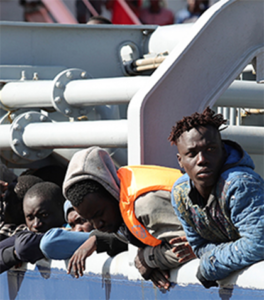EU migration plan faces challenges
The European Union has released its long-awaited migration policy plan that focuses on mandatory burden sharing but also on sending illegal migrants back to their home countries.
The ‘Migration and Asylum Pact’ is the latest effort by the EU’s executive to create a comprehensive, pan-European plan for managing migration.
 Backed by Germany, the bloc’s most powerful member and the EU’s current rotating president, it includes mandatory rules for sharing the migration burden, whether that means hosting asylum seekers or sponsoring returns of failed applicants.
Backed by Germany, the bloc’s most powerful member and the EU’s current rotating president, it includes mandatory rules for sharing the migration burden, whether that means hosting asylum seekers or sponsoring returns of failed applicants.
It also aims to strengthen control of Europe’s external borders, with new plans to screen all migrants and fast track those unlikely to get asylum, crack down on human trafficking; as well as increasing support for countries of origin and transit to give people reasons to stay home.
But migrant rights advocates say the pact renounces the EU’s international obligation to uphold the rights of people in need.
European Commission President Ursula von der Leyen said the plan strikes a fair balance between responsibility and solidarity among member states.
“It is not a question of whether member states should support with solidarity and contributions but how they should support,” Ms von der Leyen said.
The commission’s plan needs to be approved by the 27 member states, and some European leaders expressed concerns before its details were even announced.
Migration is a deeply divisive issue in the EU. Countries on the front lines of the migrant influx, such as Greece, Spain and Italy, want much more burden sharing and other support. Others, like Hungary and Austria, flatly object to taking in new migrants.
The release of the pact comes just after the recent fire at Europe’s largest migrant camp on the Greek island of Lesbos. While Germany has agreed to welcome more than 1,500 of the migrants, other countries are taking in far fewer, or none.
Europe’s migration influx has fallen significantly since more than a million people arrived in 2015. Last year saw just 140,000. Even so, seven European countries, including EU members Hungary and Croatia, top a new Gallup poll as the world’s hostile places for migrants and refugees.
The European Commission says it will unveil proposals on legal migration next year, as well as on Europe’s open border Schengen system.
Migrant advocates point to the fact that since 2013, thousands of people have died or endured violence, misery and tragedy in inhumane conditions due to the EU’s failed migration policy.
Some says the EU has given in to the demands of Hungary’s authoritarian and nationalist President Viktor Orbán,
And they say it will mean asylum-seekers who would – under normal EU procedures – have their applications recognised would now be faced with impossible bureaucratic procedures.
And this will result in the majority of them being unfairly denied protection and be returned to the country they had fled from.
Migrant advocate Cornelia Ernst of the Confederation of European Green Groups said the proposal runs contrary to the letter and spirit of the Universal Declaration of Human Rights, the Geneva Convention and the EU Charter of Fundamental Rights.
“By putting joint returns at the core of the new policy, the Commission has turned the whole idea of solidarity on its head,” she said.
“When asylum seekers are rejected and cannot be returned to their home countries, it’s usually because these places are not safe. We don’t want increased ‘efficiency’ in returns because that means deporting people.
“For the EU’s asylum policy to be more efficient, we need to make it more humane and more welcoming. We need safe and legal passages to asylum in the EU. We need fair and orderly procedures for the relocation of asylum seekers within the EU from the first day of their arrival,” Ms Ernst said.












